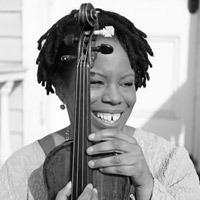An Evening with the Regina Carter Quartet at La Jolla Music Summerfest 2017

Regina Carter, photo used by permission of the La Jolla Music Society
The notion of inspiration is mysterious. Equally mysterious to me is the character trait of determination, often a corollary in the successful realization of inspiration. What motivates one to super-human effort bereft of outward encouragement and atta-boys or in the present case, atta-girls?
The narrative of Regina Carter’s career seems to be ultimate victory in the face of what must have been a daunting slog through disappointment and discouragement wherever she looked. It is difficult to conjure the image of an African-American violinist from Detroit with some substantial classical training and professional experience deciding that her life was going to be committed to jazz and improvisational music back in the early 1980s. How did she survive the many inevitable lectures from her Job’s friends advising her to drop her ridiculous dream of being a jazz violin soloist in favor of a simpler, well-defined path that would lead to making a nice living playing music that was, according to them, more suited to her instrument?
Yet, with her perseverance, obvious gifts, determination and (probably) a little luck, Carter has established a new standard for the genre, picking up a ton of awards as well as a MacArthur Grant along the way. She certainly stands upon the shoulders of some gigantic predecessors such as Ray Nance, Stéphane Grappelli, Billy Bang and, by her own admission, Jean-Luc Ponty, though to my ears the violinist who is most present in her playing is Stuff Smith (1909-1967). Carter brings a similarly intense, nearly gonzo timbral approach as Smith, with the deep pocket groove of the Swing Era master updated with excellent intonation and bowing refinement.
Ably accompanied in her quartet of long-standing colleagues (Marvin Sewell, guitar; Chris Lightcap, bass; Alvester Garnett, drums), the group executed a finely focused musical concept. Pulling heavily from their most recently recorded work of tunes associated with the late Ella Fitzgerald, it was most pleasant to hear their uniquely profiled work. Eschewing both Fitzgerald’s most popular hits as well as tried, true yet tired ensemble formulas, the band kept the packed audience enraptured at the UC San Diego Department of Music’s Conrad Prebys Concert Hall on Saturday, August 19.
Opening with the bluesy “I’ll Never Be Free,” one was immediately struck by the sheer naturalness of her sound. Void of any affectation, Carter chose to amplify her demure instrument with a single, suspended overhead microphone. The technique worked very well because the sound engineer was able to avoid any unpleasant acoustic feedback. By her not choosing either an electric instrument or an acoustic one with an attached mic or transducers, the band’s overall sound melded together effectively with no single instrument sticking out.
The playing was not overly virtuosic or even highly distinctive, although they displayed a remarkable degree of appropriateness. In general their performance seemed to eschew oh wow! moments in favor of mere excellence, with everyone just doing their job. This near diffidence lent the ensemble a great deal of charm, though there were definitely some moments of overtly impressive playing.
One such moment was the rather verbose Garnett drum solo on his original paean to New Orleans entitled (I believe) “NewFoundOrleans.” The recently composed work opened with an extended free-improvisation prelude that set an intentionally unsettled mood for what was to follow. This portrait of the city’s tragic history, with the mistreatment of many of its citizens during the Katrina crisis after generations of racial abuse by politicians and law enforcement, posited New Orleans as the epitome of so many of the disturbing complexities and difficulties plaguing contemporary life in the United States.
After the free intro, the tune states a traditional, old-timey melody over a 2nd line drum feel that gave Carter the opportunity to dig into her impressive bag of “fiddle” tricks. Her stylistic choices were apposite and filled with insider-joke musical quotes (“I’m Gonna Wash That Man Right Out Of My Hair” for one – Carter and Garnett are recently married, nice flood allusion…) ending her solo unaccompanied with “When the Saints Go Marching In.” A tad trivial perhaps, but effective in calling to mind place as a metaphor. This false outchorus led to a long, impressive and muscular drum solo which demonstrated Garnett’s impressive chops and deeply passionate musical sense. Although a bit stentorian and perhaps a little drawn out, the solo did serve to bring the composer/drummer’s profound emotions to the surface. The success of the performance overshadowed any sense of inappropriate indulgence.
The evening’s concert offered multiple paroxysms of joy. “I’ll Be Seeing You” was lovingly delivered in a manner that seemed to clearly articulate the song’s lyrics. One of the more significant aspect of Carter’s playing is her approach to vibrato. She seems to use it sparingly in the manner of contemporary jazz saxophonists and trumpet players. Kind of a refreshing approach.
Closing with an original number by the Cameroonian bassist Richard Bona entitled “Mandingo Street” provided the musicians with an entirely different palette upon which to create. The tune sounded deeply ethnic (I’m presuming west African only because of the composer’s heritage) and was performed as an ostinato with infinite variation. The texture was uniquely woven for the tune, and, since the group is so sensitive to issues of ensemble, this allowed the musicians to explore space that had not been visited by other vehicles. It was a marvelous way to send the overjoyed audience out of the Prebys, humming a new song on the UC San Diego campus.
